A Scottish farmer on African soils
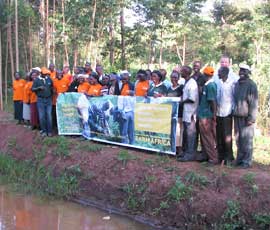
Farmers Weekly‘s 2011 Farmer of the Year, Charlie Russell, travelled to Kenya and Uganda with the charity Farm Africa. It was an eye-opening experience, as he explains
Farming can be isolated, challenging and unrewarding – but visiting Africa made me realise just how lucky we are.
On the surface, there are many similarities between agriculture in the two continents and, indeed, some major advantages of farming so close to the equator.
Kenya and Uganda have some of the world’s most fertile soils. The organic-rich, free-draining, easily-worked top soils have a naturally neutral pH and come in depths of up to 20ft. It’s sunny most of the year, with an average annual temperature of 26C and there are two rainy seasons six months apart that deliver an average rainfall of 31 inches an annum. These growing conditions left us salivating.
Like many neighbouring countries, Kenya and Uganda’s populations are sustained by crops, which are largely produced under rain-fed conditions. But here it is not averages that count; it’s the peaks and troughs that make the difference between life and death.
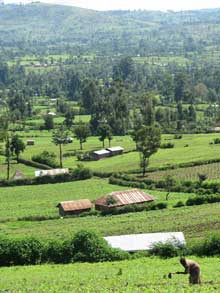 Input costs of fertilisers, chemicals and seeds are generally the same cost a unit when converted back into pounds, but farmers in the western world have grown to expect certain things. When we order seed, it is generally accepted that it will be of sufficient quality to germinate and that breeders will have selected seed to increase yield and resistance to basic pests and diseases. When we want to investigate a new project, we look at the internet, go on a visit or phone someone (“speed dial is knowledge”, I continually preach). When we order anything, we expect it – or at least something very similar – to turn up. This is not the case in Africa.
Input costs of fertilisers, chemicals and seeds are generally the same cost a unit when converted back into pounds, but farmers in the western world have grown to expect certain things. When we order seed, it is generally accepted that it will be of sufficient quality to germinate and that breeders will have selected seed to increase yield and resistance to basic pests and diseases. When we want to investigate a new project, we look at the internet, go on a visit or phone someone (“speed dial is knowledge”, I continually preach). When we order anything, we expect it – or at least something very similar – to turn up. This is not the case in Africa.
Imagine farming in a remote region, one day’s walk from the nearest market place. You are well respected and hold a position of responsibility in the local community, because your family has farmed here for generations. You are a relatively big farmer, growing wall-to-wall maize, because that is what everyone does. You inherited your land, valued locally at £6,000/acre, from your father, who taught you everything you know. You own 1.2 acres. You have 11 children, because that’s how many successful people have. However, the average wage in the area (if you can find work, which will be difficult because the rural unemployment rate is 25%) is £1.15/day. Your crops are continually decimated by variable rain, poor-quality seed and destroyed by pests and diseases, yielding an average of 250kg/acre. How do you improve your lot?
This is where Farm Africa is so vital. With the knowledge of locals, they assist community groups through various projects, such as the Ugandan Upland Rice and Beans project. They work with the best farmers in the area, who involve and inspire the local community members in a seed project to multiply pest- and disease-resistant seed to supply fellow members in the next season.
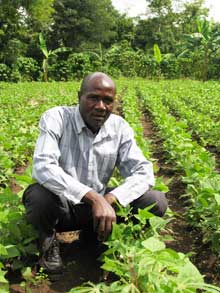 In Kalembwe Village we met champion farmer, Baale George (pictured right). On Baale’s farm, bean yields were 245kg/acre, but in 2012 – with Farm Africa’s provision of disease-resistant seed, improved cultivation and seeding techniques as well as training on the use of insecticides, pesticides, and fertilisers – this was increased to 2.5t/acre in a year. This multiplication will supply 205 farmers in the community with an acre of disease-resistant seed next year, which has the capability of increasing their yields tenfold, immediately changing their lives.
In Kalembwe Village we met champion farmer, Baale George (pictured right). On Baale’s farm, bean yields were 245kg/acre, but in 2012 – with Farm Africa’s provision of disease-resistant seed, improved cultivation and seeding techniques as well as training on the use of insecticides, pesticides, and fertilisers – this was increased to 2.5t/acre in a year. This multiplication will supply 205 farmers in the community with an acre of disease-resistant seed next year, which has the capability of increasing their yields tenfold, immediately changing their lives.
An army of local volunteer-farmers turns up to assist Baale with the cultivations, applications and harvest; the atmosphere we find when we visit is filled with song and hope.
“Farm Africa is like my mother and father,” he told me. “Its training, knowledge and support have given me and this whole community a better future.”
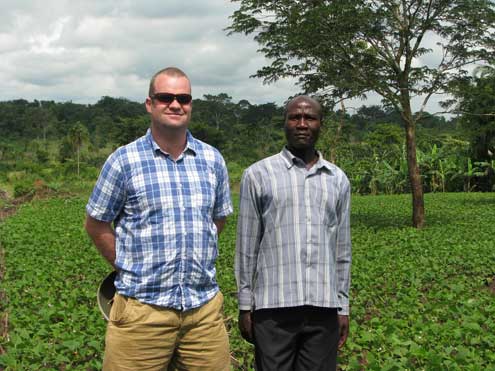
Charlie Russell with Baale George.
Kalembwe Village is not an isolated community seed project; we saw this success story all over Uganda and Kenya with upland rice, ground nuts and beans.
However, what was truly amazing was how the communities’ infectious enthusiasm spread. We pulled over to speak to a group in an “unscheduled stop” about 45 minutes’ drive from a project and, even there, the farmers recognised the Farm Africa logo, could speak about the work and had started to change their own techniques as a result.
Farm Africa’s holistic approach is apparent in a wide range of projects. We spent time in the Rift Valley province of Kenya with the YESA (Youth Empowerment through Sustainable Agriculture) pilot project.
The YESA project staff are working with 500 young people to support their aim to develop a vibrant rural economy and make more informed decisions about their sexual and reproductive health.
The project has been running for about two years, working alongside Young Farmers of Kenya, the Ministry of Agriculture and the Ministry of Health, who are encouraging the formation of Young Farmers’ Clubs within high schools and in community youth groups throughout the region. With new knowledge of and confidence in animal and crop husbandry, processing and marketing, they are able to produce more, higher-quality food, add value and sell products for a better price.
Farm Africa’s assistance always includes constant back-up from expert consultants or farmers, marketing advice and initial financial priming, but their projects are wide-ranging.
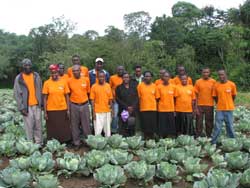 We saw cabbage growing for local hotels and schools at the Sitatunga Glory Youth Group (right).
We saw cabbage growing for local hotels and schools at the Sitatunga Glory Youth Group (right).
At the Uwezo Poultry Project, Farm Africa has primed a youth community group with materials to build a poultry house, an initial breeding flock of 66 point-of-lay pallets and cockerels and the first month’s feed. During our visit, chairman Naftali Mutai and his colleagues took great pride in showing us their hen house and egg production statistics. They had just started selling eggs and were adapting their business model to produce chickens to expand their flock, as well as to sell enough to pay for feed.
The Gognac Youth group had dug a pond and stocked it with 1,750 Tilapia fingerlings. In America, it’s known as the “aquatic chicken” because it is so fast-growing. It grows to full size (about 0.5kg) in less than six months. This group had set a target of establishing a fish pond on every one of their 27 members’ land. Not only will this bring in additional income for all the families, it will also guarantee a consistent supply and, in turn, develop markets, create constant work for the youths in the area and increase buying power.
But it was the YESA project staff’s work in the schools that really shook my soul. The reality for many rural children is that any education remains a distant hope. And for those who attend schools, drop-out rates can be high. There are issues related to teenage pregnancies and sexually-transmitted diseases – often as a result of people being attacked.
At one school we visited, there were 23 pregnancies in the 2011 academic year prior to Farm Africa’s involvement; in 2012 there have been none.
In the course of 2011, Farm Africa supported schools to build polytunnels to grow tomatoes and establish vegetable gardens. The YESA staff have worked with teachers to spread learning on animal and crop husbandry, plus sexual and reproductive health (HIV/AIDS is a big problem in young adults in Kenya).
The schools’ produce is collectively marketed under the YESA banner and the schools have a competition to see who can market the most produce.
At Chisare Girls School, this has produced sales of 40,000 Kenyan shillings, which paid the fees of children who would normally have dropped out, enabled the school to upgrade its water supply, provide sanitary products and build a boarding house. The latter will create a safe environment for the girls and reduce the amount of walking they have to do, which is when most of the attacks occur.
I had previously been to Kenya and Uganda on holiday and before this visit had plenty of cynicism about the challenges in Africa. Having had the humbling experience of meeting these people, my old adage of “you make your own luck” has been exposed as nonsense.
On all our visits, we were greeted like friends, treated like royalty, but left sombre and reflective on how so little and so few have made such a difference.
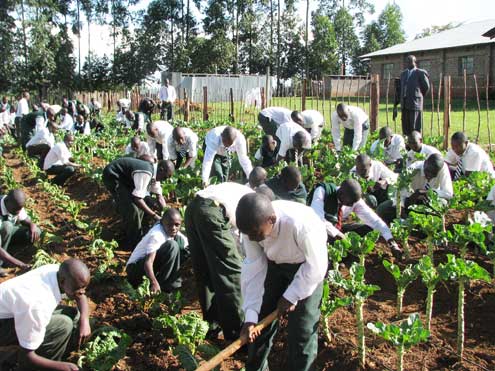
I remain confused to why the eastern African nations can’t do more to help themselves. It strikes me it has nothing to do with the value of crops, as when you eat everything you produce, the value of it is meaningless. It is not because these nations don’t want to work. How many of us could stand shoulder to shoulder with them cultivating acres of land with nothing but a hoe?
It is, instead, connected to the lack of available capital. How can you upgrade to better-quality seed, for example, if you simply don’t have the money?
I also now believe it has a lot to do with knowledge and confidence. In UK agriculture, we have access to gigabytes of data, consultants and advisers, and yet crop failures still occur. They end in a loss-making scenario, but never in the starvation of our children. It’s no wonder that in eastern Africa – where there is a very real possibility of this happening if you change your system and it doesn’t work – people are reluctant to take the risk.
In the UK, we have all felt at times that we are stuck in a rut, but we have the knowledge that things can get better. In Africa, that often isn’t the case. This is no rut – this is how farmers live.
The cost of priming projects such as the ones Farm Africa are involved in is relatively low, but the value is massive. They instil knowledge and build confidence, allowing people to improve their lives.
What I saw was alternately heart-wrenching and inspiring. My view of African farmers has changed forever.
ABOUT FARM AFRICA |
|---|
Farm Africa is a different kind of charity, working to end hunger and bring prosperity to rural Africa. It’s bringing technology and know-how to farmers, helping them manage their resources for the long term and end the cycle of despair. Farm Africa is on the ground with farmers to make sure the best farming techniques take root and spread, so there’s food, not just this harvest, but every harvest. The charity bridges rural communities, governments and businesses so farmers can grow food and sell it, too, making sure Africa’s farmers build better lives. To donate or to find out ways to get involved please visit the Farm Africa website or call 020 7430 0440.
|
For more on this topic
See our Farm Africa visit page

